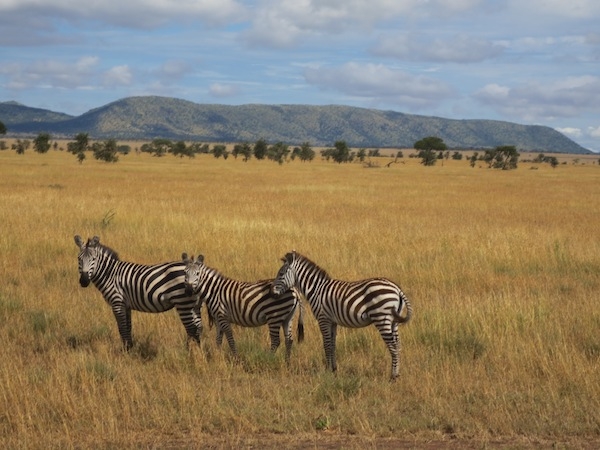Making the transition from "volunteer" to "tourist."
A little over a month ago, I marked the end of my international volunteer journey. Bidding farewell to East Africa, I shed a few tears (not joyful) upon landing on the snow-covered ground in Toronto, and then stoically (not wisely) decided to return to my office the very next day.
As someone who has spent extended periods of time outside of Canada before, I am well aware of “reverse culture shock.” Also known as “re-entry stress” or “re-acculturation,” it’s the difficulty of adjusting back to your own national or local home culture or environment. Having gone through it before, I thought I had well-developed coping strategies to deal with it, and could dive back into life relatively unscathed. However, in perfect honesty, I’ve found myself in a bit of a daze. What I hadn’t taken into account is the fact that this reverse shock is experienced in a different way, and in different stages every time you return from a unique international experience, and may not always be just about “culture.”
My transition back from international volunteering to “normal life” has been a process in stages. After finishing my work with YCI and before returning to Canada, I took a few weeks to travel around Uganda and northern Tanzania. What many international volunteers may not realize is that this travelling interlude can generate its own distinct form of shock. After hard-won efforts to immerse myself with a local family, learn as much Kiswahili as possible, and understand local community realities as best I could, I found it challenging to embrace the role shift from volunteer to tourist—particularly when travelling in the country where I worked.
Despite selecting small tour operators who emphasized grassroots travel, the well-defined safari circuits we followed strongly catered to perceptions of what tourists want: controlled interaction with locals; cultural performance (e.g., a one-hour visit to a “traditional” village) versus cultural immersion; minimal demand for new language acquisition; and limited deviation from familiar Western foods. By falling into this “tourist” category, I felt acutely sensitive and resistant to these perceptions and the subsequent sugar-coating of reality that occurred, and couldn’t help but feel that my experience suddenly became…shallow.
Moreover, the way that I was perceived and expectations that I was assumed to hold, the shift in the purpose of my journey from “community contribution” to “personal enjoyment,” and the simple fact that I had the time, means and ability to travel around East Africa—motivated by curiosity and not necessity—heightened my sense of unearned and unjust privilege.
The return back to Canada, armed with photographic evidence of my encounters with mountain gorillas in the rain forests of Bwindi and the wild beasts of the Serengeti, marked the beginning of a second phase of transition with its own unique shocks. One aspect of this shock has been physical, including jet lag and the major change in climate (amplified by an unseasonably cold Canadian spring). A second aspect of this shock has been cultural: following the chaos, colour and community orientation of Zanzibar, life back in Canada seems newly individualistic, sanitized and muted—feelings intensified by returning to work in a cubicle.
Beyond these very common forms of re-entry stress, the return home can also initiate a period of emotional and spiritual questioning and growth, tied to questions of equity, identity and one’s place in, and contribution to the world. For myself, I have been engaging in the process of “moral accounting”— what I refer to as one’s own personal efforts to process and come to terms with their lived experience of the world’s birth lottery—seeing and feeling major inequities in wealth, health, and opportunity. This moral accounting is something that I’ve experienced in the past, and was most acute after I returned from Ghana (my first major foray overseas). I find myself experiencing it in a different way this time; no longer a poor student, I can’t help but look at the relative material abundance and comfort of my own household with renewed eyes, and feel a conflicting mix of gratitude, sadness and disgust.
My experience in Zanzibar, like many travel experiences, was also highly introspective. There is something about having a few months of “pause” that opens the door to a great deal of self-reflection; free from every day routines and distractions, I found had the space to discover new strengths and abilities within myself, reflect on who I am and who I want to become and ponder my contribution to the world. At the same time, travel experiences can be incredibly intense—enamoured with soaking up the experience, I didn’t have a great deal of opportunity to fully digest everything I learned and experienced in real-time, and have had to use the last few weeks to slowly and retroactively mull over these insights.
This inspired soul-searching can generate its own form of pressure and agitation for change and greatly impact how (and if) you are able to return to life as it was—an uncomfortable and somewhat disconcerting revelation. Upon returning home, the most “shocking” impact may thus be realizing that you are returning to a realm of possibilities. Armed with new insights and clarity, the routines, patterns, habits and ways of thinking that you held before going abroad have already been interrupted or broken, and nothing needs to be exactly as it was.
Beyond attempting to force yourself back to “business as usual,” the challenge then becomes figuring out what you do with the new insights that you have gained, and how you decide to move forward from your experience into the realm of possibilities. This can be as simple as deciding that you want to start volunteering on social justice initiatives, to as big as a career change. My advice: take it slow, and follow your heart.
